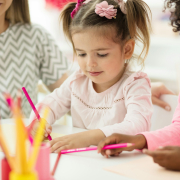Goodbyes Made Easier: Helping Your Child Feel At Home In Daycare
Starting daycare is a significant step for both children and parents. It marks the beginning of a new routine filled with new faces, new places, and new experiences. While this transition can be exciting, it can also bring about feelings of anxiety and uncertainty for your child. Helping them feel at home in daycare is vital to ensure this change goes smoothly.
Children thrive in environments where they feel safe and comfortable. A welcoming daycare setting can make a huge difference in your child’s adjustment. Familiarity with surroundings, friendly caregivers, and engaging activities can help your child feel more at ease. These factors contribute to creating a space that feels like a second home.
Developing a consistent routine can also support your child during this transition. Predictability helps children understand what to expect, reducing anxiety and building trust in their new environment. Additionally, encouraging positive social interactions with peers and caregivers helps foster a sense of belonging and security. Making friends and forming bonds with caregivers can transform the daycare experience from daunting to delightful.
In this article, we will explore various strategies to make goodbyes easier and help your child feel at home in daycare. By implementing these approaches, you can ensure a smoother and happier transition for your child.
Creating a Comfortable Daycare Environment
A comfortable environment is crucial for helping children feel at home in daycare. The physical space should be inviting and kid-friendly, with bright colours, engaging toys, and age-appropriate furniture. Soft rugs, cosy corners, and plenty of natural light can make the area feel warm and welcoming.
Caregivers play a significant role in creating a nurturing environment. Warm, friendly, and approachable staff can ease the transition for children. When caregivers show genuine interest and affection, children feel safer and more secure. It is essential for caregivers to interact positively with children, offering reassurance and support.
Familiarity also helps children feel comfortable. Allow your child to bring a favourite toy or blanket from home. This item can provide comfort and a sense of familiarity in a new setting. Displaying pictures of family members in the daycare can also create a sense of continuity between home and daycare. By creating a cosy and safe environment, you can help your child settle in more quickly.
Building a Consistent Routine
Consistency is key when it comes to helping children adjust to daycare. A predictable routine provides a sense of security and helps reduce anxiety. Children feel more confident and relaxed when they know what to expect.
Start by establishing a morning routine that prepares your child for the day ahead. Set a regular wake-up time, have breakfast together, and create a consistent drop-off routine. A cheerful and loving goodbye can make a big difference in how your child feels about the day ahead.
Daycare routines should also include regular activities and structured playtime. Schedules that include a mix of free play, structured activities, snack times, nap times, and outdoor play help children understand what to expect. Posting this schedule where children can see it helps reinforce this predictability.
Celebrate small milestones in the routine, such as staying for the whole day without feeling distressed. Positive reinforcement and consistency in daily activities build trust and make the daycare experience less daunting for your child.
Encouraging Positive Social Interactions
Positive social interactions are vital for your child’s happiness and development in daycare. Encourage your child to form friendships by talking excitedly about meeting and playing with new friends. Explain how sharing and taking turns can make games more fun and help build friendships.
Daycare staff should also facilitate social interactions. Group activities, games, and shared projects create opportunities for children to work together, fostering teamwork and cooperation. Simple activities like building blocks, arts and crafts, or story time can all encourage kids to interact with each other.
It is also helpful to encourage your child to express their feelings and listen to others. Role-playing different social scenarios at home can help children practice how to introduce themselves, join a group, or resolve conflicts. These skills will help them navigate social situations confidently and build lasting relationships with their peers.
Effective Tips for Easing Separation Anxiety
Separation anxiety is common when starting daycare, but there are ways to make parting easier. Begin by gradually getting your child used to the idea of being apart. Start with short periods away from each other and slowly increase the time as your child becomes more comfortable.
Create a goodbye ritual that reassures your child. This could be a special hug, a high-five, or a cheerful phrase that signals you will return. Keeping the goodbye short and sweet can also help; long, drawn-out farewells can increase anxiety.
Reassure your child that you will come back and stick to your promise. Consistency is key. If possible, show your child on a clock or with a visual cue when you will return. Having something concrete to look forward to can relieve some of their worries.
Additionally, stay positive and calm during drop-offs. Children can sense your emotions, so displaying confidence and happiness can help ease their anxiety. If your child sees that you trust the daycare environment, they are more likely to feel secure and less anxious.
Conclusion
Helping your child feel at home in daycare involves creating a comfortable environment, building consistent routines, encouraging positive social interactions, and easing separation anxiety. Each of these steps plays an important role in ensuring your child’s smooth and happy transition into daycare.
At Eskay Kids, we understand how challenging this process can be for both children and parents. Our play-based curriculum is designed to make children feel welcomed and engaged, helping them develop important social and cognitive skills. We invite you to visit our early childhood education centre to learn more about how our nurturing environment can support your child’s growth and happiness.




